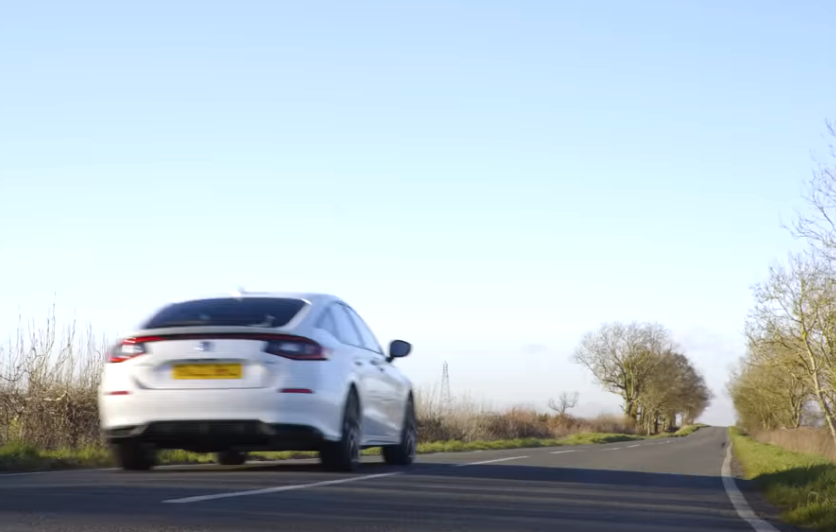
Discover how the Honda Civic eHEV’s impressive fuel economy stacks up against plug-in hybrids and electric cars in this comprehensive running cost comparison.
I recently tested the Honda Civic eHEV and was blown away by its fuel economy. In my hands, this hybrid managed an astonishing 80 miles per gallon. That got me thinking: could an efficient full hybrid like this actually be cheaper to run than an electric car?
How the Honda Civic eHEV’s Hybrid Powertrain Works
Honda’s new eHEV hybrid powertrain uses a 2-liter petrol engine and two electric motors. The first motor acts as a generator, sending electricity to the second motor to drive the wheels or into a lithium-ion battery pack. The engine can drive the wheels directly or with the help of the motors and battery.
Because the petrol engine isn’t working alone, it doesn’t have to work as hard or use as much fuel. The official WLTP (Worldwide Harmonised Light Vehicle Test Procedure) fuel economy figure for the Civic eHEV is 56.5 miles per gallon. But in the real world, it’s incredibly easy to exceed that number.
Real-World Fuel Economy: Easily Achieving 60-80 MPG
Driving around normal roads at 30 miles an hour, the Honda Civic eHEV can very easily achieve between 60 and 80 miles per gallon. That’s incredible fuel efficiency for a hybrid car.
Let’s crunch some numbers. The Civic eHEV has a 40-liter (8.4 UK gallons) fuel tank. At today’s fuel price of 148.4 pence per liter, it costs £59.36 to fill up. Over the course of one year, doing 10,000 miles:
- At a conservative 60 MPG, your total fuel cost will be £1,124
- At an impressive 80 MPG, your total fuel cost drops to £843
Plug-in Hybrids: Unraveling the Running Costs
Plug-in hybrids can be tricky to compare. Their fuel economy varies wildly depending on how you drive them. Some models boast official figures of 230-256 MPG, but these numbers are basically nonsense in the real world.
Realistically, if you plug in regularly, you might manage 80-150 MPG. But without regular charging, you’re more likely to see 30-45 MPG – not much better than a conventional petrol car. Plug-in hybrid running costs depend heavily on whether you have convenient access to charging.
Electric Cars: Charging Costs and Efficiency
How do electric cars stack up against our ultra-efficient Honda Civic eHEV? Let’s look at charging costs and real-world efficiency.
Electric car efficiency is measured in miles per kilowatt-hour (kWh). I typically average around 3 miles/kWh in most EVs. Home charging costs vary depending on your electricity tariff:
- On a standard rate of 32.42p/kWh, charging an EV for 10,000 miles would cost £1,296 per year including VAT – way worse than the Civic eHEV
- On an Economy 7 EV-specific night rate of 16.09p/kWh, annual charging costs drop to a very competitive £562
- Relying purely on rapid public chargers at 73p/kWh would set you back an eye-watering £2,433 per year – over double the Civic’s fuel costs!
Hybrid vs Electric Car Running Costs: A Comprehensive Comparison
So, how do the Honda Civic eHEV, plug-in hybrids, and pure electric cars really compare in terms of running costs? It depends on your specific situation.
An efficient full hybrid like the Civic offers very competitive fuel costs, especially if you can’t regularly plug in a PHEV or don’t have access to cheap home charging for an EV.
EVs typically cost more to buy upfront than hybrids. So while you might save on fuel, it could take decades to recoup the price difference. However, electric cars do have lower maintenance costs and zero tailpipe emissions.
FAQ
Are electric cars always cheaper to run than hybrids?
Not necessarily. It depends on electricity costs, driving habits, and access to charging. An efficient full hybrid can be very cost-effective, especially without cheap home charging.
Do I need to plug in a hybrid car?
Full hybrids like the Honda Civic eHEV don’t need to be plugged in – they cleverly recharge their small battery while driving. Plug-in hybrids offer the best efficiency when plugged in regularly, but can still function as normal hybrids if necessary.
What’s the most efficient hybrid car?
The Honda Civic eHEV is one of the most efficient hybrids on the market, easily achieving 60-80 MPG in real-world driving. However, Toyota and Hyundai also offer very efficient full hybrid models.
How much does it cost to fully charge an electric car?
Charging costs for an electric car vary depending on the size of the battery and your electricity tariff. Charging a 60 kWh battery at home on a standard tariff typically costs around £19. Public rapid charging is much pricier at roughly £44 for the same charge.
The key takeaway? There’s no one-size-fits-all answer. Efficient full hybrids, plug-in hybrids, and electric cars all have their merits depending on your budget, driving habits, and access to charging. The most important thing is to crunch the numbers for your specific situation before taking the plunge on your next eco-friendly car.